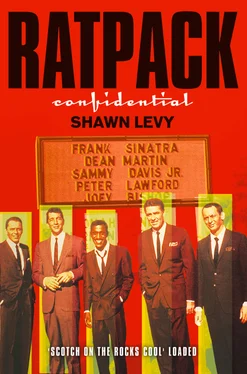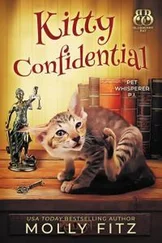Suddenly, everything: Frank signed to play the Paramount Theater in Times Square as an “extra added attraction” with the popular Benny Goodman orchestra; when Goodman introduced Frank, the response from the packed theater was so volcanic that he asked his band, “What the fuck was that?” Within a few months, the whole world would know. Spontaneously, Frank had become the beloved of a generation of wild-eyed fans—young girls, mostly—who made him a teen idol decades before anyone ever thought to manufacture such a thing.
Boosted by the devilishly clever press agent George Evans, Frank became bigger than Crosby or Vallee or Caruso—the biggest thing ever in showbiz, in fact. There was a core of critics and musicians among the cognoscenti who admired his artistry (James Agee spoke fondly of his “weird, fleeting resemblances to Lincoln”), but the wellspring was the kids—the bobby-soxers, as they were named for an affectation of footwear. Sinatratics they called themselves, forming cultish cells in devotion to their new god: the Slaves of Sinatra, the Sighing Society of Sinatra Swooners, the Flatbush Girls Who Would Lay Down Their Lives for Frank Sinatra, the Frank Sinatra Fan and Mahjong Club.
These daughters of flappers were quick to connect the longing in Frank’s voice with their own longings, his quavery presence with the absent boys who were off fighting the Hun and the Nip (Frank was 4-F: punctured eardrum). Odd as it may have seemed to everyone in the business, the wiseass runt with the heavenly voice was some kind of sex symbol. (And he’d always be one: For a half-century, Frank was one of the ways America made love, quite often the most popular; he was able to get away with anything because he hit people in their most personal spots.)
By the late fifties, by Rat Pack time, when his audience had grown up, Frank could be as sexy as he felt, but in the first blush of his fame, he had, like all teen idols, to be officially Off Limits. Conveniently, he had a cozy domestic life to play up: He’d been married to a girl-next-door type since 1939; by 1944, they had two kids, one named after each of them: Little Nancy and Frankie Jr.
For George Evans—and for Frank’s many important employers: Columbia Records, CBS radio, MGM, Lucky Strike—this was a perfect setup: a talented, massively popular young guy with a solid family and a wholesome aspect. But Frank seemed hell-bent on screwing it up. There was that entourage—big, unlikely guys, boxing writers, gamblers, songwriters buttering him up—and there were women and there was this habit of snapping back at the press and there was all the politics: Bad enough he was 4-F; did he have to sing “Ol’ Man River” and break bread with Eleanor Roosevelt? Evans spent the better part of the forties covering Frank’s ass, cozying up to some columnists and scratching and clawing at others while his client carried on however he pleased, simply assuming that somebody else would sweep it up.
He rose to insane heights. In 1939, he was waiting tables at the Rustic Cabin for $15 a week; by the end of the war, he was a bigger star in more media than anyone in the world and had grossed an estimated $11 million. By sheer earnings standards, he was probably the biggest star ever, anywhere; it almost didn’t matter that he was an artistic genius with more pure vocal talent than virtually anyone who’d ever been recorded.
Still and all, he was a creature of the popular culture and, as such, subject to the public’s whimsies. As the forties closed, talk leaked into the press about ties to communism and mobsters, there were ugly spats with writers, photographers, waiters, carhops, fans. His once-promising film career had sputtered— The Kissing Bandit , anyone?—and, after Frank made a wisecrack about one of Louis B. Mayer’s mistresses, MGM gave him his release. On the radio, he was bumped down from Your Hit Parade to a fifteen-minute, B-level show; on TV, CBS just plain dumped him.
He had trouble with his voice—he opened his mouth once at the Copa and couldn’t make a sound come out—and he seemed, further, to have lost his aesthetic way, letting Columbia’s new A&R man, Mitch Miller, talk him into making horseshit records with arrangements scaled wrong for his voice and dog barks thrown in as comic relief. The pathetic fall seemed poetically complete in 1952 when he returned to the Paramount Theater in support of a film of his own (the forgettable Meet Danny Wilson ) and couldn’t even fill the balcony, much less stop traffic in Times Square.
Frank had gone from “extra added attraction” to King of the Universe in a couple of years; then, in about the same time span, he couldn’t get a job—and not a few people in the business were glad of it. With his ambition, quick temper, and iconoclasm, he’d done a lot of pissing off in his decade on the scene. His reputation was poison: When Capitol Records president Alan Livingston told his staff that he’d signed Sinatra at terms very favorable to the company, they groaned as one.
Presaging all of this calamity, turning the bobby-soxers against him and making him look like some pathetic pussy-whipped Milquetoast, was his wanton affair with Ava Gardner. Frank had never been faithful to Nancy in even a loose sense of the word, but, like many showbiz wives, she seemed willing to put up with peccadilloes even with such hot numbers as Marilyn Maxwell and Lana Turner. But this thing with Ava was more passionate and public than any of his other dalliances; it might have begun as a meaningless Hollywood fling, but they carried on all over the country throughout 1949, and Frank’s cardboard marriage finally became untenable. In the spring of 1950, he left the pretty Italian girl and the three cute kids that were his P.R. chastity belt. George Evans, enervated and skinny to begin with, bald from defending him, up and died one night after arguing with a columnist about Frank and Ava; he was forty-eight, and his heart had given out.
The affair and subsequent marriage were absurdly tempestuous and about as private as a presidential campaign; Ava was a lioness and Frank was her plaything. She was as promiscuous, lustful, hard-drinking, and profane as he was, and she had the hooks into him but good. She busted his balls mercilessly, running off with bullfighters and making him look like an ass in front of the world. He threatened suicide several times and took two stabs at it—once in Lake Tahoe with pills, once in New York with a razor. His disgrace and comeuppance were complete: Not only was he a has-been as a singer, an actor, and a performer, he was a flop as a cocksman. He was a joke: last year’s punch line.
When he finally managed to crawl out of his hole, then, it was all the more resoundingly triumphant. He achieved it in part through a movie role—Maggio, the pip-squeak private who died horribly at the hands of a bullying sergeant in From Here to Eternity. Throughout the latter half of 1952, Frank campaigned actively with Columbia Pictures president Harry Cohn to get the part, and Cohn’s relationship with the Chicago Outfit’s West Coast point man, Johnny Rosselli, assured Frank at least a hearing. He got the job, he did really good in it, he got the Oscar, poof: He was all better. Once considered an overweening interloper in Hollywood, he was suddenly in the spring of ’54 a resilient, dues-paying member of the acting club. He had done the good thing; he had died for his fame and resurrected himself. He made more movies and he had hit after hit; he was even good in some of them.
At the same time, he took a new turn musically. No longer was he the reed-thin, warbling young crooner with a voice like a viola and a closet full of floppy bow ties. Now working for Capitol Records, he was more propulsive and dynamic, his voice richer and deeper—a cello. He was wearing fedoras and stylish suits; he was singing up-tempo about swinging and in dramatic, elegiac tempi about loss.
Читать дальше












